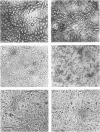Abstract
Understanding the basic virology of rotavirus infections has been hampered by the fastidiousness of most isolates and by the lack of a rapid quantitative assay method. The growth characteristics of the simian rotavirus SA11 were studied because it grows to high titers in tissue culture and infectivity can be quantitated by plaque assay. SA11 replication was analyzed in a variety of primary cell cultures or continuous cell lines derived from both homologous and heterologous hosts. Viral replication was observed in each of the cell cultured examined. The individual cell cultures demonstrated marked variability in their susceptibility to rotavirus infection. The highest titers were obtained with MA104, BSC-1, CV-1, and BGM cells. Observable cytopathic effect was found to correlate with the percentage of infected cells in the culture. This study presents growth curves of the simian rotavirus in a variety of cell cultures.
Full text
PDF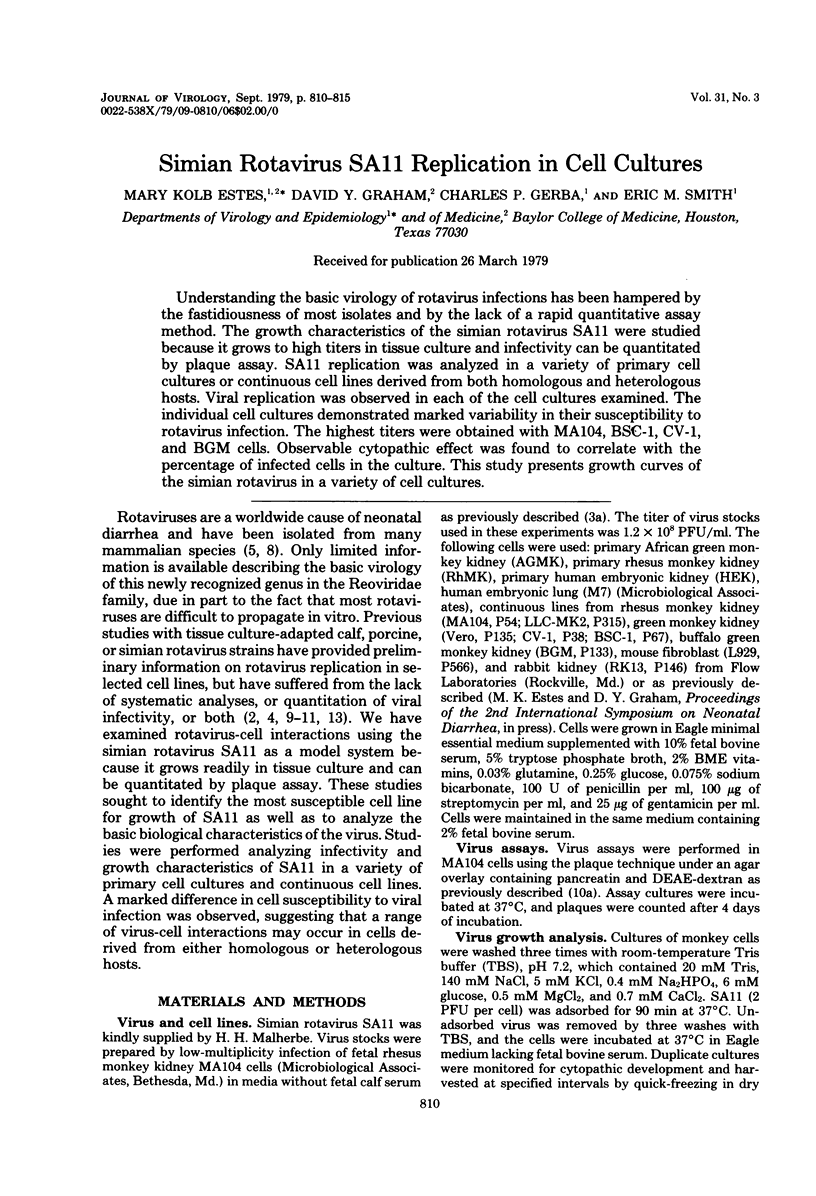
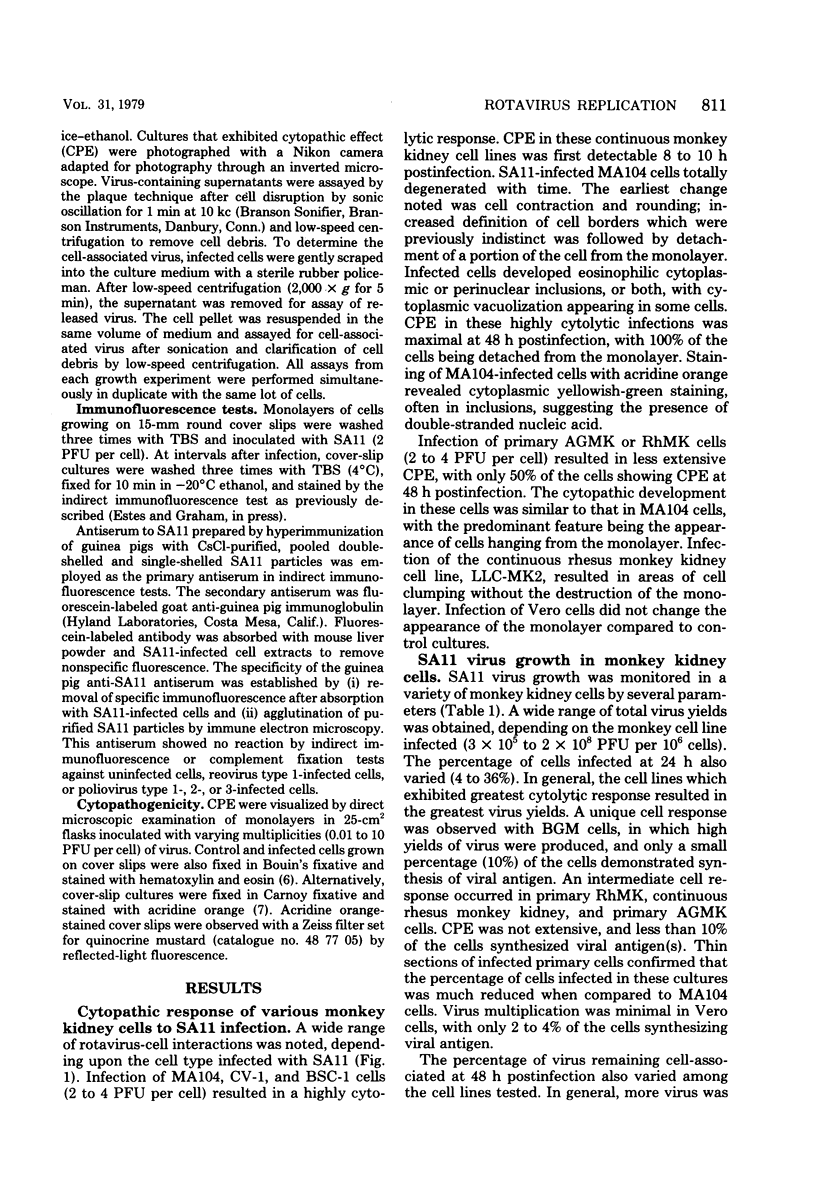
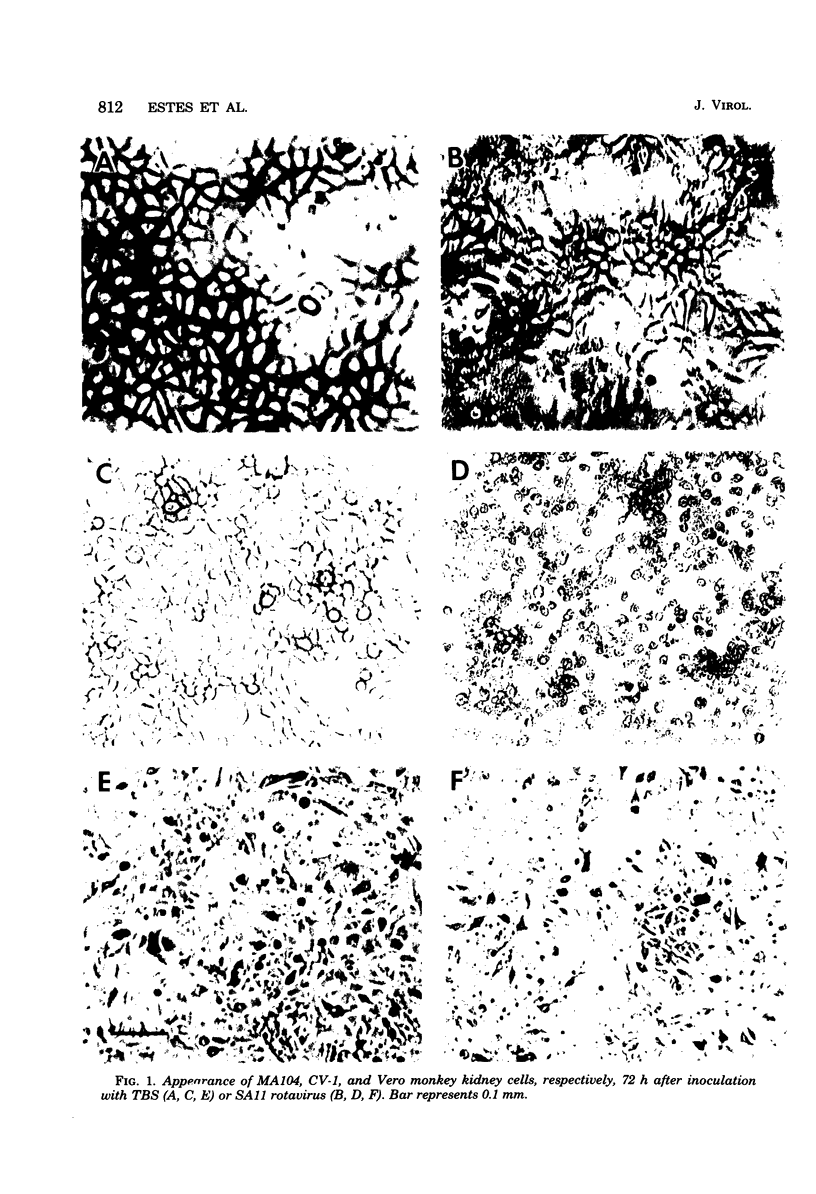
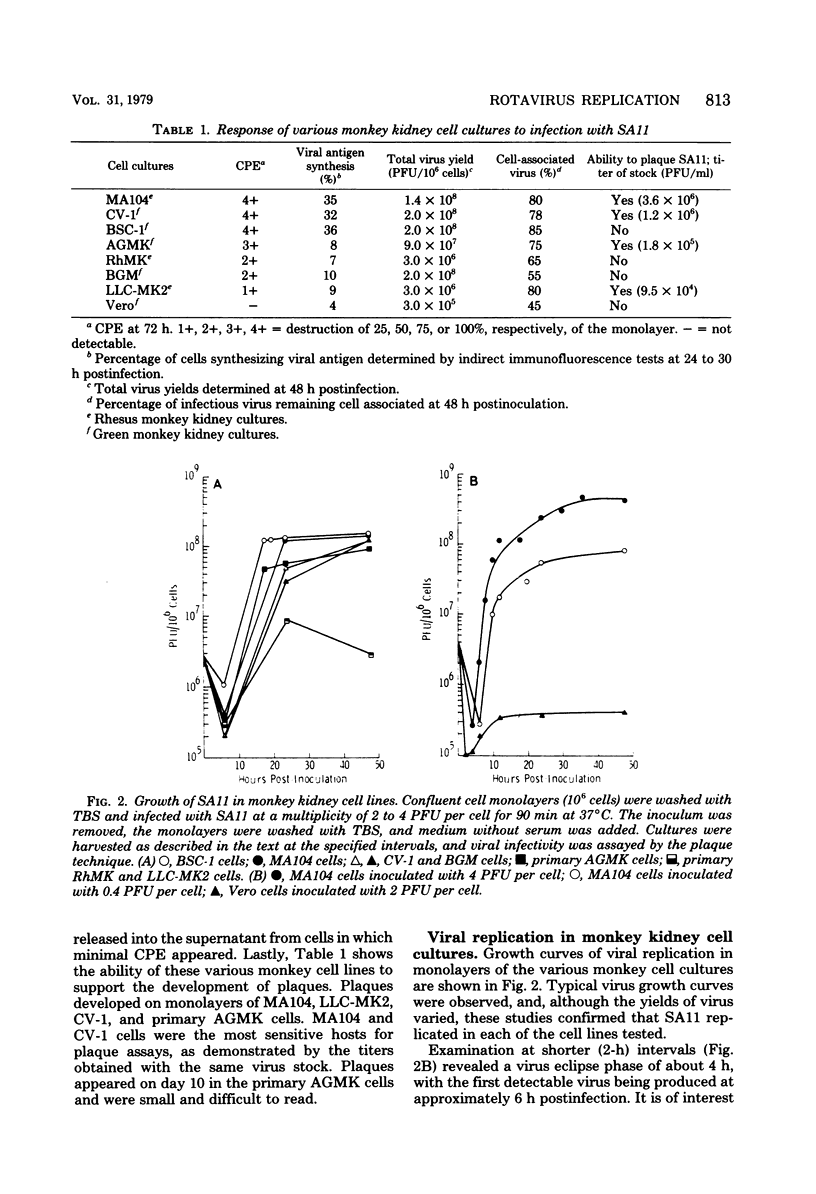
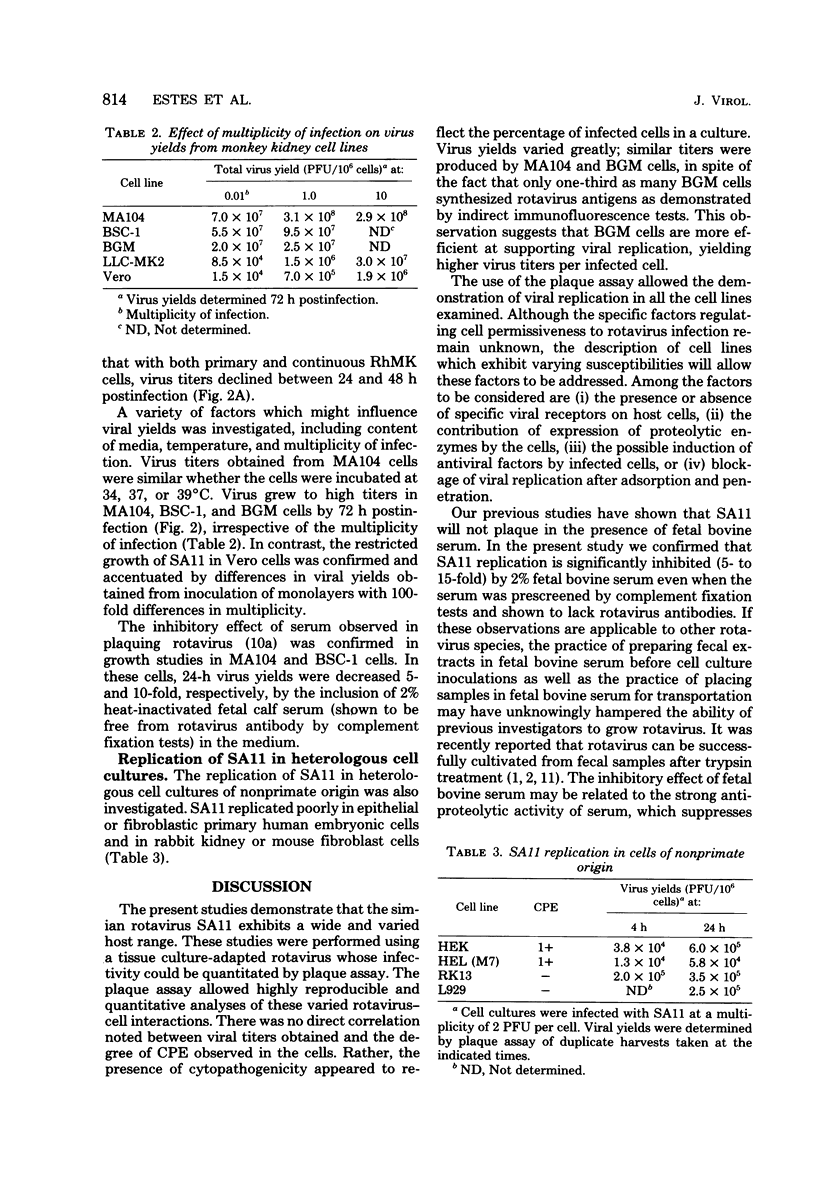
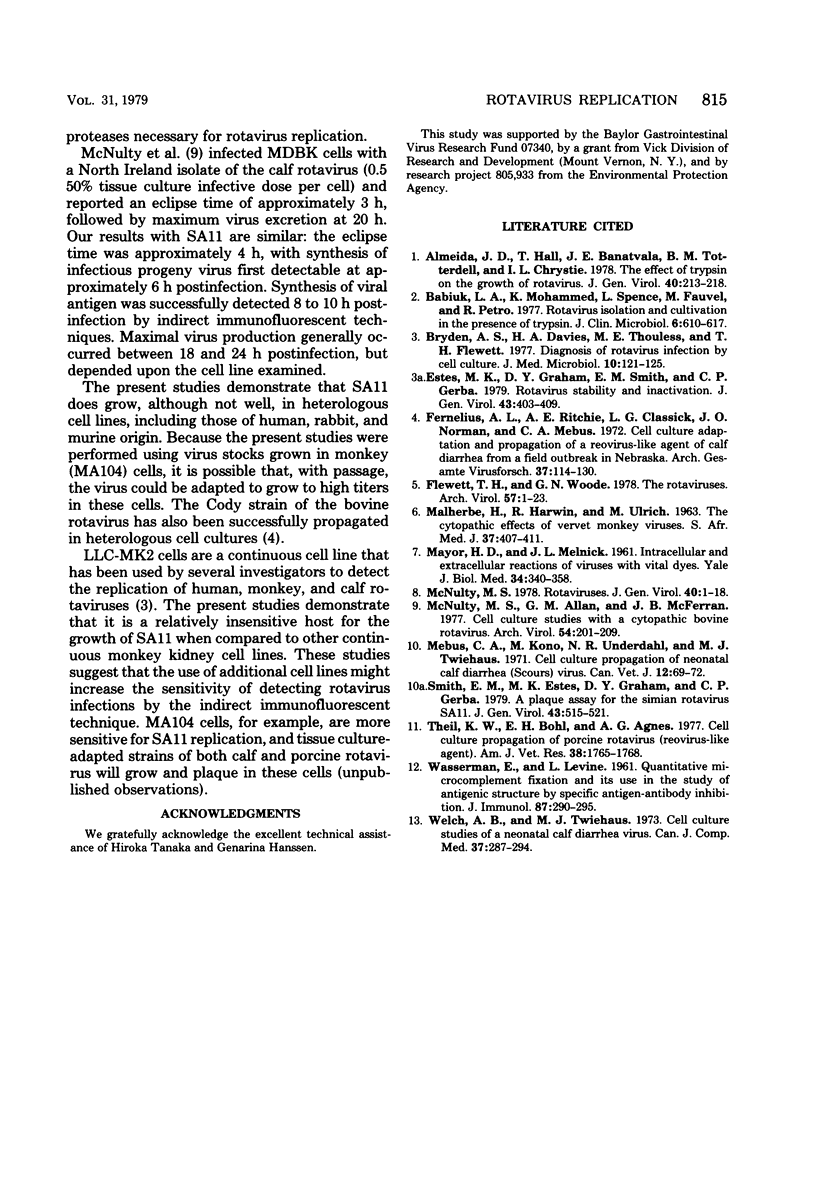
Images in this article
Selected References
These references are in PubMed. This may not be the complete list of references from this article.
- Almeida J. D., Hall T., Banatvala J. E., Totterdell B. M., Chrystie I. L. The effect of trypsin on the growth of rotavirus. J Gen Virol. 1978 Jul;40(1):213–218. doi: 10.1099/0022-1317-40-1-213. [DOI] [PubMed] [Google Scholar]
- Babiuk L. A., Mohammed K., Spence L., Fauvel M., Petro R. Rotavirus isolation and cultivation in the presence of trypsin. J Clin Microbiol. 1977 Dec;6(6):610–617. doi: 10.1128/jcm.6.6.610-617.1977. [DOI] [PMC free article] [PubMed] [Google Scholar]
- Bryden A. S., Davies H. A., Thouless M. E., Flewitt T. H. Diagnosis of rotavirus infection by cell culture. J Med Microbiol. 1977 Feb;10(1):121–125. doi: 10.1099/00222615-10-1-121. [DOI] [PubMed] [Google Scholar]
- Estes M. K., Graham D. Y., Smith E. M., Gerba C. P. Rotavirus stability and inactivation. J Gen Virol. 1979 May;43(2):403–409. doi: 10.1099/0022-1317-43-2-403. [DOI] [PubMed] [Google Scholar]
- Fernelius A. L., Ritchie A. E., Classick L. G., Norman J. O., Mebus C. A. Cell culture adaptation and propagation of a reovirus-like agent of calf diarrhea from a field outbreak in Nebraska. Arch Gesamte Virusforsch. 1972;37(1):114–130. doi: 10.1007/BF01241157. [DOI] [PubMed] [Google Scholar]
- Flewett T. H., Woode G. N. The rotaviruses. Arch Virol. 1978;57(1):1–23. doi: 10.1007/BF01315633. [DOI] [PMC free article] [PubMed] [Google Scholar]
- MALHERBE H., HARWIN R. The cytopathic effects of vervet monkey viruses. S Afr Med J. 1963 Apr 20;37:407–411. [PubMed] [Google Scholar]
- MAYOR H. D., MELNICK J. L. Intracellular and extracellular reactions of viruses with vital dyes. Yale J Biol Med. 1961 Dec;34:340–358. [PMC free article] [PubMed] [Google Scholar]
- McNulty M. S., Allan G. M., McFerran J. B. Cell culture studies with a cytopathic bovine rotavirus. Arch Virol. 1977;54(3):201–209. doi: 10.1007/BF01314786. [DOI] [PubMed] [Google Scholar]
- McNulty M. S. Rotaviruses. J Gen Virol. 1978 Jul;40(1):1–18. doi: 10.1099/0022-1317-40-1-1. [DOI] [PubMed] [Google Scholar]
- Mebus C. A., Kono M., Underdahl N. R., Twiehaus M. J. Cell culture propagation of neonatal calf diarrhea (scours) virus. Can Vet J. 1971 Mar;12(3):69–72. [PMC free article] [PubMed] [Google Scholar]
- Theil K. W., Bohl E. H., Agnes A. G. Cell culture propagation of porcine rotavirus (reovirus-like agent). Am J Vet Res. 1977 Nov;38(11):1765–1768. [PubMed] [Google Scholar]
- WASSERMAN E., LEVINE L. Quantitative micro-complement fixation and its use in the study of antigenic structure by specific antigen-antibody inhibition. J Immunol. 1961 Sep;87:290–295. [PubMed] [Google Scholar]
- Welch A. B., Twiehaus M. J. Cell culture studies of a neonatal calf diarrhea virus. Can J Comp Med. 1973 Jul;37(3):287–294. [PMC free article] [PubMed] [Google Scholar]



